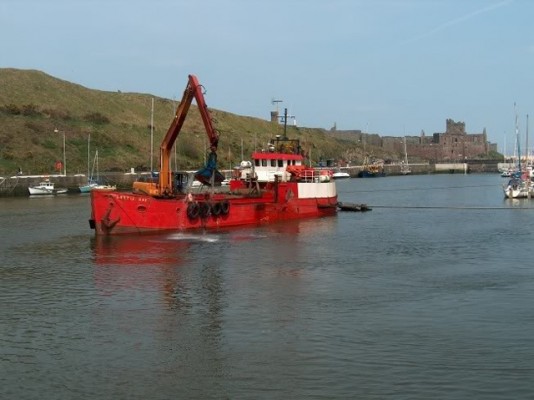Dredging work is under way to remove up to 18,000 tonnes of silt from Peel marina, which has been preventing half of the berths from being used.
The excavated material is being transported to a temporary storage site near to Poortown Quarry on the outskirts of Peel.
The Department of Infrastructure, working in partnership with the Department of Environment, Food and Agriculture, says that disposing of the silt on land provides a safer and more controlled solution to dumping it at sea.
Infrastructure Minister Phil Gawne MHK said: ‘This work is urgently needed. Parts of Peel marina are dry or very shallow because of the build-up of silt. If action is not taken we would be faced with the prospect of closing even more berths.
‘This would cause significant harm to both the local and national economy. The number of vessels attending the Peel Traditional Boat Weekend in 2014 was well down on previous years and there is a growing perception that Peel marina is too silted up to accommodate visitors.’
He added: ‘Commercial, environmental and reputational concerns over the disposal of silt at sea have resulted in us looking at land-based options.
‘Following detailed analysis a site at Poortown Quarry has been identified. I must stress that this is only a temporary measure and we will continue to press for a permanent solution.’
The Department owns the land off the Poortown Road and has dug a storage pit ready to accept the silt. A special membrane will be installed, while a layer of sand and clay will provide an additional barrier to any leaching of the deposited material. Pipework will take any run-off to settlement tanks.
RA O’Neill Ltd, a specialist marine contractor based in Northern Ireland, has been engaged to carry out the seven-week dredging, which is to be completed by the TT Festival, which begins on 30 May..
The original intention was to take the excavated material out to sea on a barge and dispose of it at a licensed dump site one mile southwest of Peel.
However, evidence suggested that heavy metals contained in the silt could contaminate the marine ecosystem. Dumping the full amount of dredged material from the entire harbour over a short period would have an adverse effect on the Isle of Man’s multi-million pound king and queen scallop industry.
Professionals have advised that the environmental impact will be significantly reduced by storing the silt on land.
The vast majority of heavy metal contaminants remain bound with the silt and can be better contained and managed than if they are dispersed over a wide area at sea.
Minister Gawne said: ‘It is important to get this work done before the TT Festival in order to support Government’s national priority of growing the economy. We have worked in conjunction with DEFA and listened to expert guidance.
‘Land-based disposal of the silt is the best temporary solution and we are confident that the engineering works being put in place will control any potential risk to farmland and water courses in the Poortown area.’
He added: ‘It is absolutely imperative that Government finds a long-term answer to the build-up of silt in Peel marina.
‘As well as identifying a permanent site to take this type of material, we will look into the effectiveness of installing a silt trap further up Peel harbour and methods of directing the natural flow of the river water and silt towards the flapgate.
‘We will also aim to dredge the marina on a more regular basis in future to keep on top of the two to three thousand tonnes of silt that is washed down by the river each year.
‘It is in everybody’s interest to work together to ensure that Peel marina remains a high-quality facility for Manx and visiting boat owners.’




